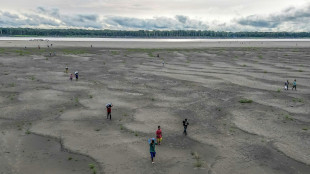
-
 UN General Assembly calls for 'unconditional' Gaza ceasefire
UN General Assembly calls for 'unconditional' Gaza ceasefire
-
Dortmund fear 'worst-case scenario' after Schlotterbeck injury

-
 Juve deepen Man City crisis, Barcelona into Champions League knockouts
Juve deepen Man City crisis, Barcelona into Champions League knockouts
-
'Incredible' Saka makes the difference for Arsenal: Arteta

-
 'We want more', says Olmo with Barcelona bound for knock-outs
'We want more', says Olmo with Barcelona bound for knock-outs
-
Guardiola 'questioning self' after latest City loss at Juve

-
 Nasdaq surges above 20,000 after US inflation data matches estimates
Nasdaq surges above 20,000 after US inflation data matches estimates
-
Torres sinks Dortmund to send Barcelona into knockouts

-
 UN General Assembly calls for 'unconditional' ceasefire in Gaza
UN General Assembly calls for 'unconditional' ceasefire in Gaza
-
US House passes defense bill banning gender care for minors

-
 Turkey says Ethiopia, Somalia reach compromise deal to end feud
Turkey says Ethiopia, Somalia reach compromise deal to end feud
-
Saka brace sinks Monaco as Arsenal eye Champions League last 16

-
 Man City crisis deepens with Champions League defeat at Juventus
Man City crisis deepens with Champions League defeat at Juventus
-
Ashworth exit 'not the best' for Man Utd says Amorim

-
 Romero sorry over Spurs transfer jibe: Postecoglou
Romero sorry over Spurs transfer jibe: Postecoglou
-
Lula to undergo new operation to 'minimize' cranial bleeding risk

-
 New Syria PM says will 'guarantee' all religious groups' rights
New Syria PM says will 'guarantee' all religious groups' rights
-
Wolfsburg earn key win over Roma in Women's Champions League, Lyon net six

-
 Murder rate in Amazon far higher than rest of Brazil: study
Murder rate in Amazon far higher than rest of Brazil: study
-
Malibu wildfire grows as thousands still evacuated

-
 Pachuca down Botafogo in Intercontinental Cup
Pachuca down Botafogo in Intercontinental Cup
-
UN General Assembly to vote on 'unconditional' ceasefire in Gaza

-
 Nine killed in Haiti in latest gang attack
Nine killed in Haiti in latest gang attack
-
US-China officials to hold economic talks before Trump return

-
 Saudi Arabia gave 'assurances' over LGBTQ fans at World Cup: English FA
Saudi Arabia gave 'assurances' over LGBTQ fans at World Cup: English FA
-
Rangers can create magical night against Tottenham, says Clement

-
 Galliano says leaving Maison Margiela after 10 years
Galliano says leaving Maison Margiela after 10 years
-
Stocks mostly rise as US inflation data boosts rate cut hopes

-
 Sundance unveils eclectic lineup for 2025
Sundance unveils eclectic lineup for 2025
-
FIFA confirms Saudi Arabia as 2034 World Cup host

-
 Germany's Scholz urges investment in 'future EU member' Ukraine
Germany's Scholz urges investment in 'future EU member' Ukraine
-
EU conservatives seek to stall 2035 combustion engine ban

-
 2034 World Cup in Saudi Arabia puts lives at risk: rights groups
2034 World Cup in Saudi Arabia puts lives at risk: rights groups
-
Russia vows retaliation after Ukrainian ATACMS strike

-
 Canada central bank makes half point rate cut to 3.25%
Canada central bank makes half point rate cut to 3.25%
-
US consumer inflation accelerates for second straight month in November

-
 Lula alert, 'progressed well' since intracranial surgery
Lula alert, 'progressed well' since intracranial surgery
-
Relatives of Syria's disappeared seek closure in Damascus morgues

-
 Food fight: $25 bn US grocery deal falls apart
Food fight: $25 bn US grocery deal falls apart
-
Google unveils latest AI model, Gemini 2.0

-
 MSF resumes some activities in Haiti's capital
MSF resumes some activities in Haiti's capital
-
NFL announces Berlin game for 2025 season

-
 Apple adds ChatGPT integration in latest software update
Apple adds ChatGPT integration in latest software update
-
US consumer inflation rises for second straight month in November

-
 Afghan refugees minister killed by suicide blast
Afghan refugees minister killed by suicide blast
-
Alisson savours 'perfect' Liverpool return

-
 Crunch time for Saudi-hosted drought, desertification talks
Crunch time for Saudi-hosted drought, desertification talks
-
FIFA to confirm Saudi Arabia as 2034 World Cup hosts

-
 Macron urges release of Georgia protesters in Ivanishvili talks: Elysee
Macron urges release of Georgia protesters in Ivanishvili talks: Elysee
-
France's Macron races to choose new PM


Malaria mortality returns to pre-Covid levels: WHO
Malaria mortality has fallen back to levels seen before the Covid-19 crisis, the WHO said Wednesday, but called for faster progress against the disease that killed nearly some 597,000 people last year.
In a new report, the World Health Organization estimated that there were 263 million cases of malaria worldwide in 2023 -- 11 million more than a year earlier -- while the death toll remained relatively stable.
But in terms of the mortality rate, "we have come back to pre-pandemic numbers", Arnaud Le Menach, of the WHO's Global Malaria Programme, told reporters.
In 2020, disruptions caused by the Covid-19 pandemic led to a sharp increase in malaria-related mortality, with an additional 55,000 deaths counted that year.
Since then the total number of deaths from malaria, which is caused by a mosquito-borne parasite, has gradually shrunk, as has the mortality rate.
The estimated 2023 mortality rate in Africa of 52.4 deaths per 100,000 population at risk meanwhile still remains more than double the target level set by a global strategy for combatting malaria through 2030, WHO said, insisting "progress must be accelerated".
- Vaccine promise -
WHO pointed to the wider rollout of malaria vaccines as a promising development, expected to save tens of thousands of young lives each year.
The two jabs currently in use, RTS,S and R21/Matrix-M, hold the promise of significantly easing the burden in Africa, which accounts for up to 95 percent of all malaria deaths.
Malaria vaccines were first introduced in April 2019, first in Malawi, with Kenya and Ghana following suit.
Through the end of 2023, nearly two million children in those three countries received jabs of the RTS,S vaccine, WHO said.
"We saw in those three pilot countries... a 13-percent drop in mortality during the four years of the pilot programme," said Mary Hamel, who heads WHO's malaria vaccine team.
The WHO now looked forward to seeing a similar drop in other countries introducing the vaccines, she told reporters, pointing out that countries that began introducing the jabs early this year were "following a similar trajectory".
So far, 17 nations across sub-Saharan Africa have included the jabs in their routine immunisation programmes, she said
Another eight countries had been approved to receive funding towards introducing the vaccines through the vaccine alliance GAVI, WHO said.
- 'Curb the threat' -
In another promising development, new-generation dual-insecticide nets nets are becoming more widely available.
These nets, which are coated in a new generation pyrrole insecticide in combination with the standard pyrethroid insecticide, have been shown to offer far better protection against malaria.
The WHO estimated earlier this year that such nets had averted 13 million malaria cases and nearly 25,000 deaths over three years.
Despite the successes, the WHO highlighted a number of factors slowing the battle against malaria, including a lack of funds and insufficient stocks of vaccines, as well as climate change, which is allowing a greater spread of the mosquitos that carry the parasite that causes malaria.
"Stepped-up investments and action in high-burden African countries are needed to curb the threat," WHO chief Tedros Adhanom Ghebreyesus said in a statement.
The Global Fund, a partnership set up to battle AIDS, tuberculosis and malaria, agreed.
"Progress has stagnated for several years," its executive director Peter Sands warned in a statement.
"To overcome this, we must accelerate our efforts through a dual approach: investing in new technologies while simultaneously easing the strain that climate change places on healthcare systems," he said.
C.Kovalenko--BTB



